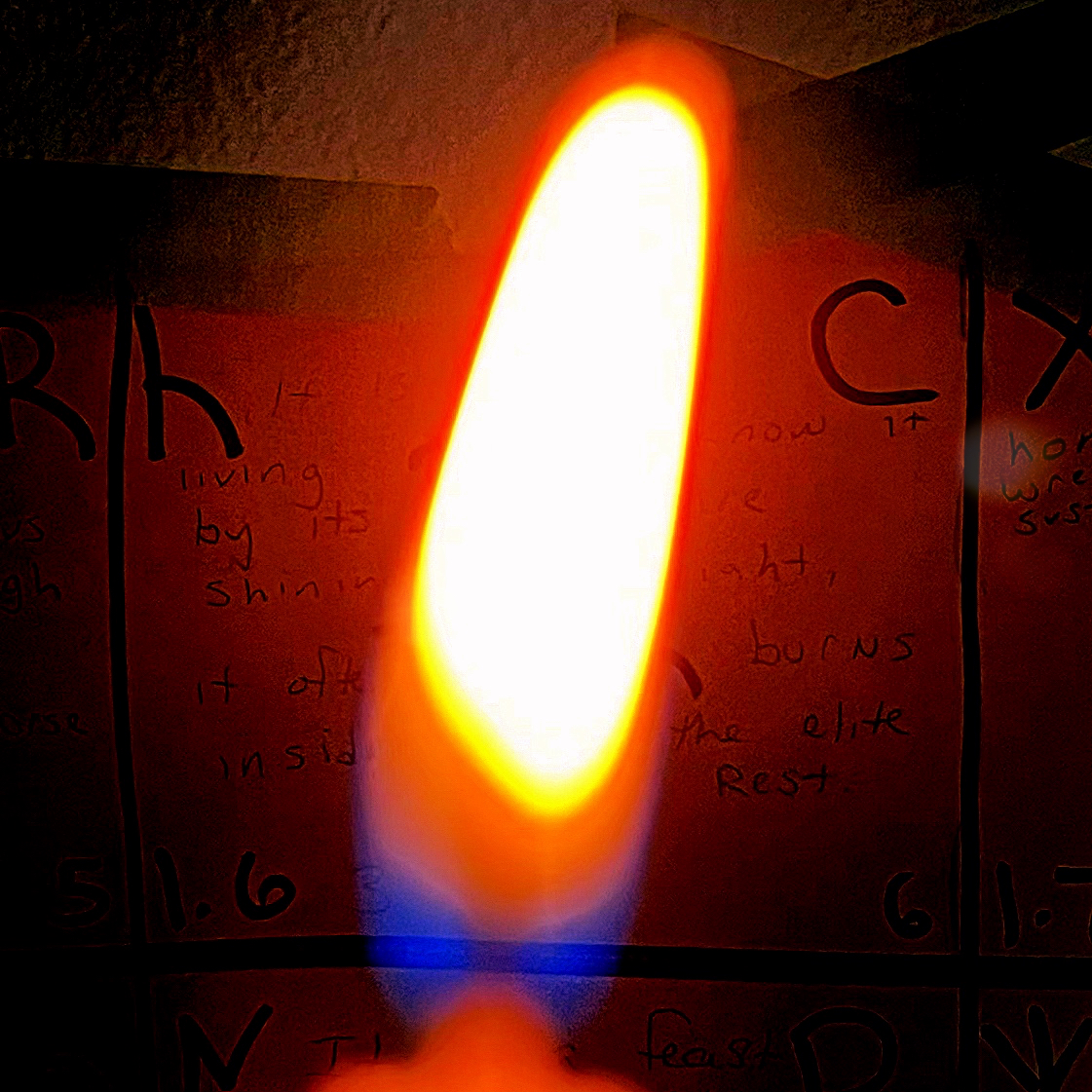
ᚳ byþ cwicera gehwam cuþ on fyre
blac and beorhtlic byrneþ oftust
ðær hi æþelingas inne restaþ ᛬᛫
It is to the living who know it by its fire
Shining and bright, it often burns
Inside where the elite rest.
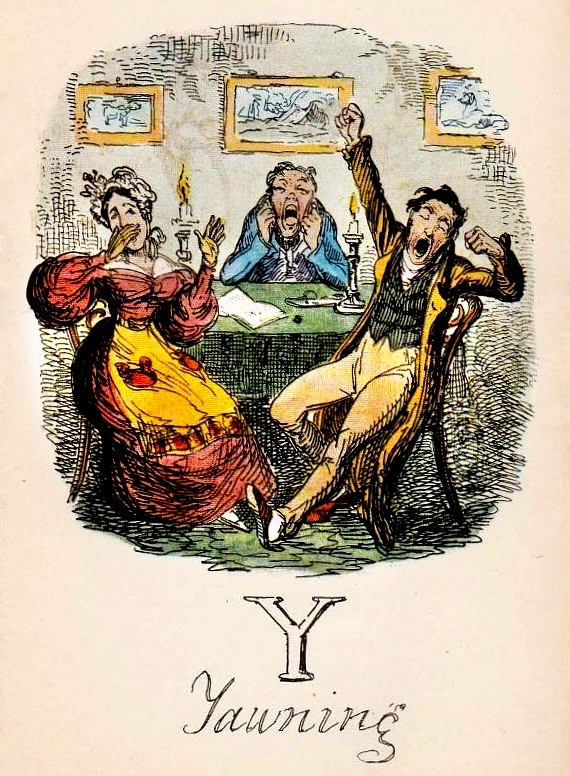
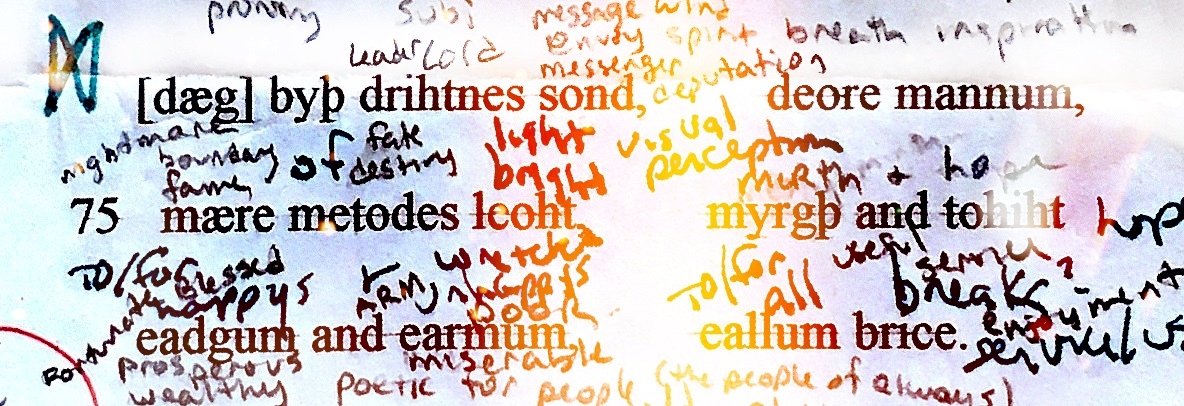 The word drihtnes appears twice in the rune poem, here and in stanza one, feoh, wealth. It means God, but in the sense of God as a lord, God the leader, the one in charge. God has other jobs: judge, executioner, advisor, muse, physician, daycare, security, human resources, accounting, project manager. All the jobs really, God is busy. Further down the CV God is also the metodes which sometimes gets translated as measurer. Metlic is something that is measurable, a metrap is a measuring rope for a field, or a sounding line to measure depth at sea. Metod is used in poetry mostly, where it means fate, destiny, and death, especially in earliest Old English, and the Rune Poem is early. God measures out our fate. God sizes us up and calculates our destiny.
The word drihtnes appears twice in the rune poem, here and in stanza one, feoh, wealth. It means God, but in the sense of God as a lord, God the leader, the one in charge. God has other jobs: judge, executioner, advisor, muse, physician, daycare, security, human resources, accounting, project manager. All the jobs really, God is busy. Further down the CV God is also the metodes which sometimes gets translated as measurer. Metlic is something that is measurable, a metrap is a measuring rope for a field, or a sounding line to measure depth at sea. Metod is used in poetry mostly, where it means fate, destiny, and death, especially in earliest Old English, and the Rune Poem is early. God measures out our fate. God sizes us up and calculates our destiny.
Drihtnes isn’t the only repetition going on here, we’ve seen tohiht (hope) and eadgum before. They were together in … More
 Cen is a rare word in Old English. It’s a torch here in the Rune Poem, and Cynewulf uses it to mean torch in his games with runes. Cynewulf: an Old English poet and fascinating person who made acrostics out of runes when signing his name to stuff, and about whom we know pretty much nothing. We know he was one of a limited few who ever signed anything. Perhaps he was a monk: it is thought most writers of Old English lived in monasteries, where the individual is not the main focus. They have a whole other focus. But you can slip your signature in there if you make something amusing out of it. Cynewulf was pretty cunning like that when it came to self promotion.
Cen is a rare word in Old English. It’s a torch here in the Rune Poem, and Cynewulf uses it to mean torch in his games with runes. Cynewulf: an Old English poet and fascinating person who made acrostics out of runes when signing his name to stuff, and about whom we know pretty much nothing. We know he was one of a limited few who ever signed anything. Perhaps he was a monk: it is thought most writers of Old English lived in monasteries, where the individual is not the main focus. They have a whole other focus. But you can slip your signature in there if you make something amusing out of it. Cynewulf was pretty cunning like that when it came to self promotion.
Perhaps we can look at Cynewulf’s name to learn a bit more about him. Sometimes the cen rune shape is written in manuscripts as shorthand for the … More
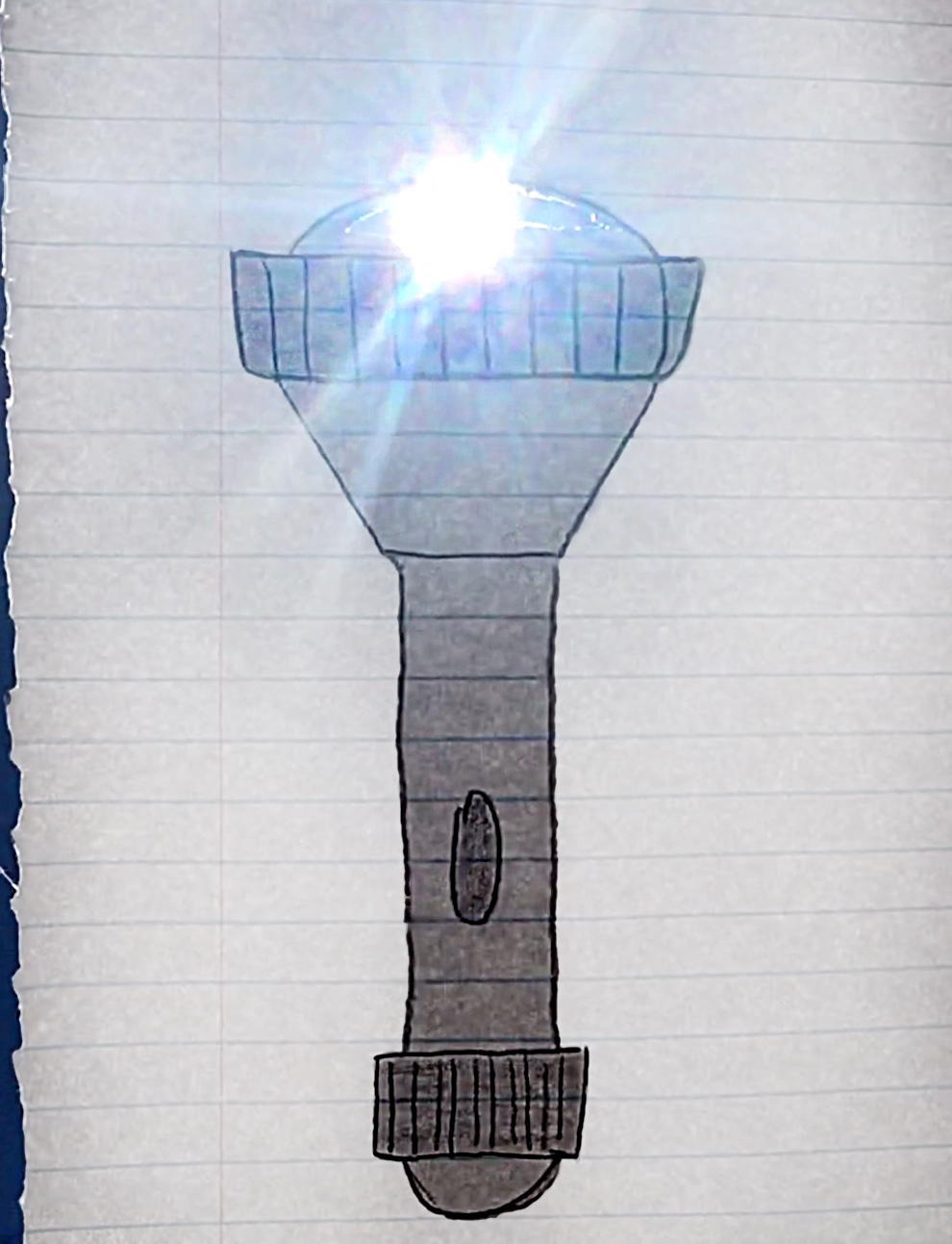 The Day and Torch stanzas are as similar as night and day and everybody knows it. The living (cwicera) know (cuþ) it in the torch stanza, you’d have to be dead not to, and it’s straight up mære (famous) in the day stanza. Who doesn’t know yin and yang? Light and dark, complimentary opposites, a two in one intruding into each others space. Like all opposing forces they need each other to survive, and we need them. We particularly favor light, it makes us all happy in the day and secure at night. Who gets to feel secure at night? Well, not everybody.
The Day and Torch stanzas are as similar as night and day and everybody knows it. The living (cwicera) know (cuþ) it in the torch stanza, you’d have to be dead not to, and it’s straight up mære (famous) in the day stanza. Who doesn’t know yin and yang? Light and dark, complimentary opposites, a two in one intruding into each others space. Like all opposing forces they need each other to survive, and we need them. We particularly favor light, it makes us all happy in the day and secure at night. Who gets to feel secure at night? Well, not everybody.
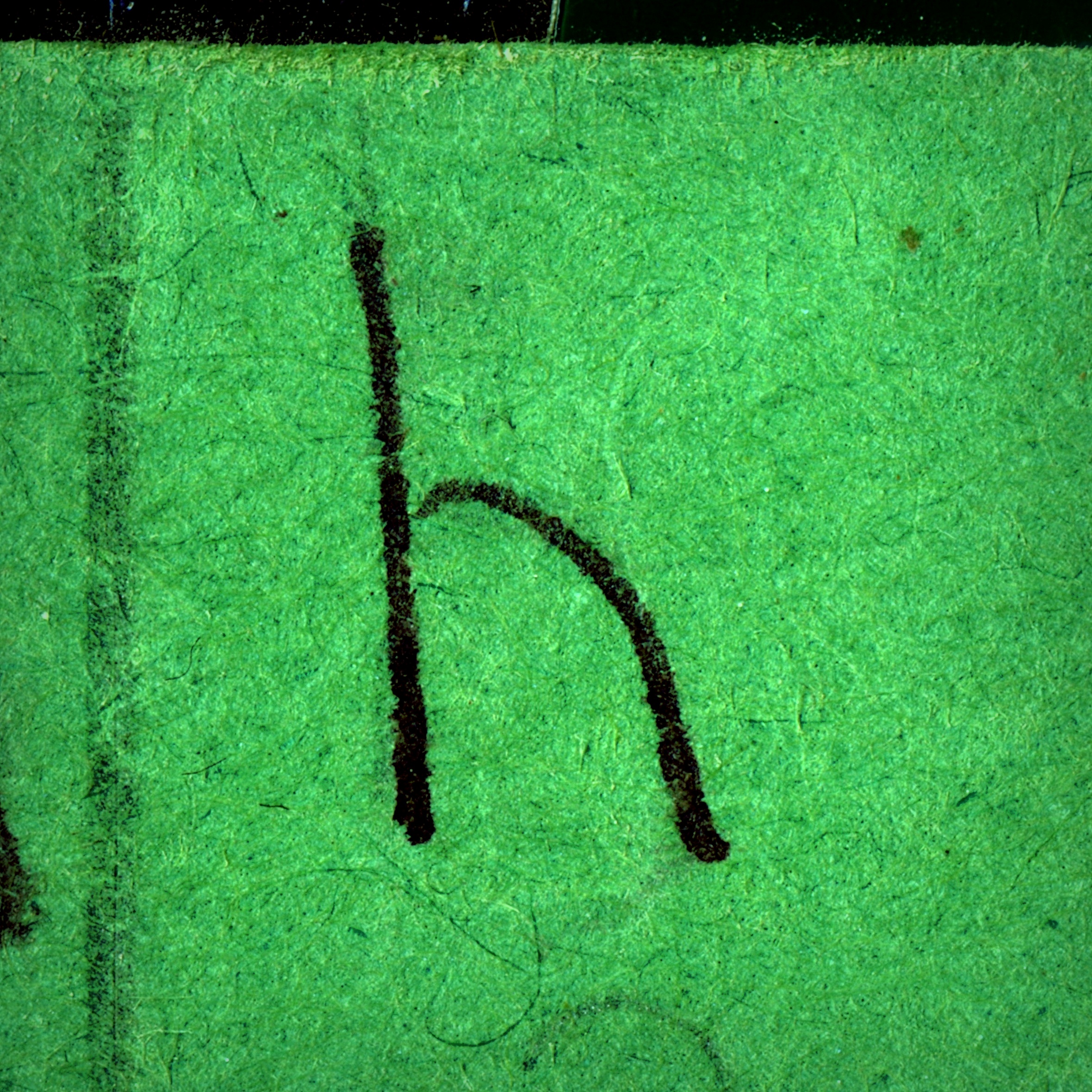 Originally the letter C made a hard sound in Old English, like a K, but because everything is temporary, over time C developed a second sound depending upon its immediate neighbors: CH (represented as tʃ by the International Phonetic Alphabet). One’s immediate neighbors can really change a vibe. In Old English C most often sounds like a K, velar region of the mouth. It moves to the front of the mouth (dental and front palate region) to make the CH sound mostly when it lives next door to a long I or long E, or a diphthong starting with these letters.
Originally the letter C made a hard sound in Old English, like a K, but because everything is temporary, over time C developed a second sound depending upon its immediate neighbors: CH (represented as tʃ by the International Phonetic Alphabet). One’s immediate neighbors can really change a vibe. In Old English C most often sounds like a K, velar region of the mouth. It moves to the front of the mouth (dental and front palate region) to make the CH sound mostly when it lives next door to a long I or long E, or a diphthong starting with these letters.
Cen is usually pronounced as cheen, or /t͡ʃeːn/ in IPA, but may also be pronounced as keen, K sound. We don’t really know what Old English sounds like. The E in Cen is a long E, so this would suggest a CH sound, except if this were a Y, and E was … More
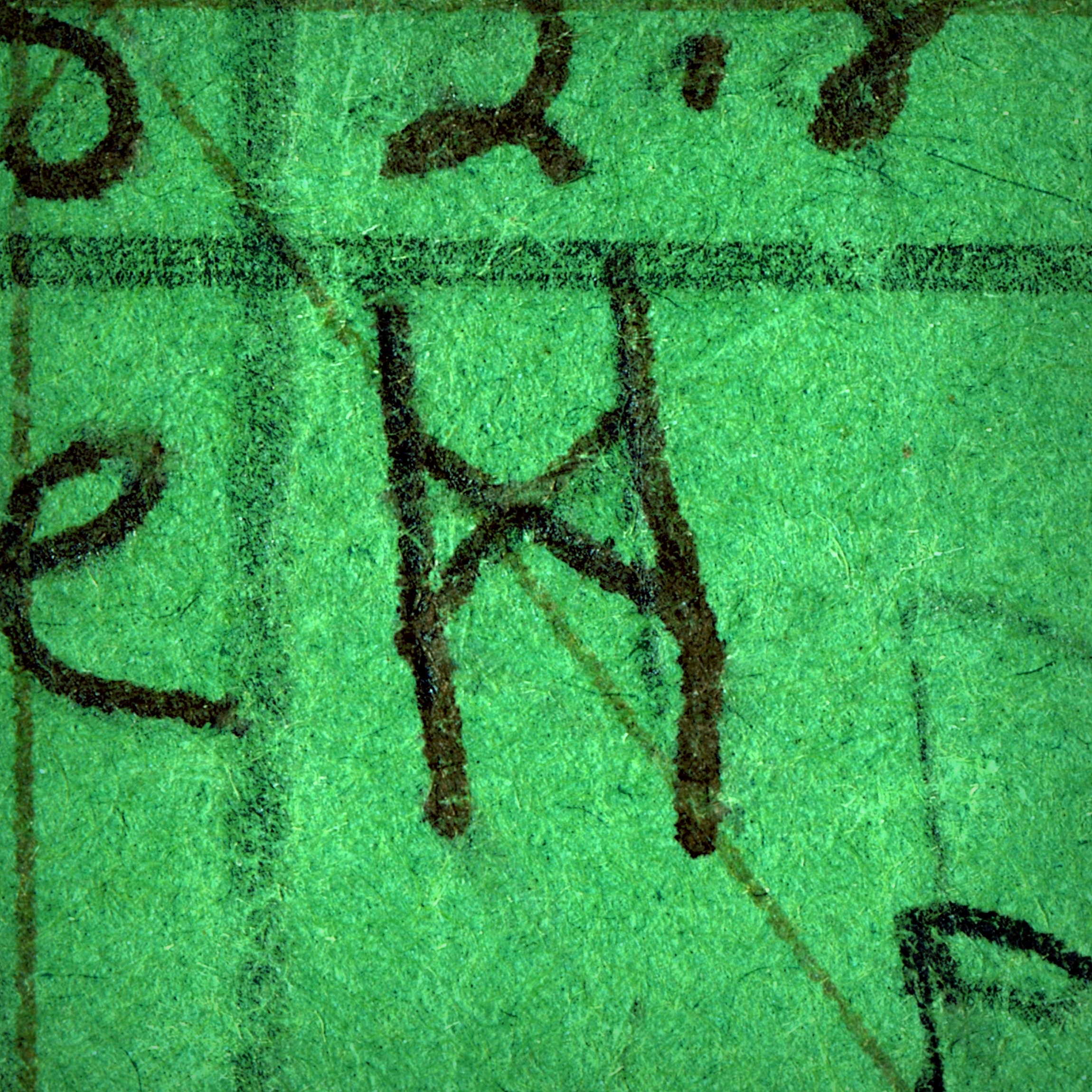 D. Voiced alveolar dental stop. You use your voice and soft palate to make the sound, make your breath stop against your teeth. Leave your larynx out of it and you make a T. D was sometimes spelled with a T in later Old English, and it would occasionally appear as the letter Eth which looks like this: Ð and this: ð. Eth is kind of a cross between a Þ (thorn, TH) and a D. A th sound with a little D flavor. Eventually the Ð and Þ became interchangeable leaving the D to stand alone, exiled in wretchedness.
D. Voiced alveolar dental stop. You use your voice and soft palate to make the sound, make your breath stop against your teeth. Leave your larynx out of it and you make a T. D was sometimes spelled with a T in later Old English, and it would occasionally appear as the letter Eth which looks like this: Ð and this: ð. Eth is kind of a cross between a Þ (thorn, TH) and a D. A th sound with a little D flavor. Eventually the Ð and Þ became interchangeable leaving the D to stand alone, exiled in wretchedness.
Make a thorn and point it at a reverse thorn. A thorn in a mirror. Let them keep in touch, they are very close.
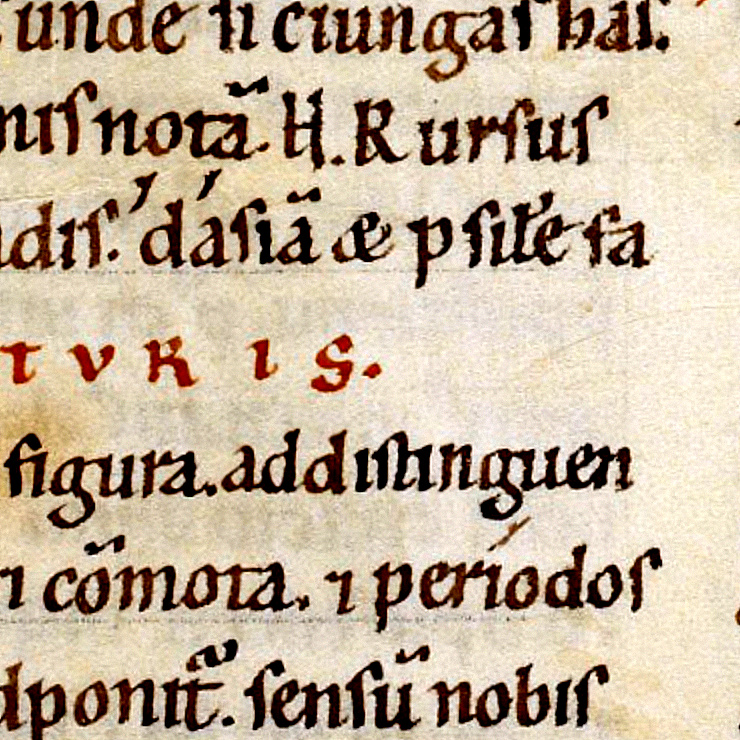
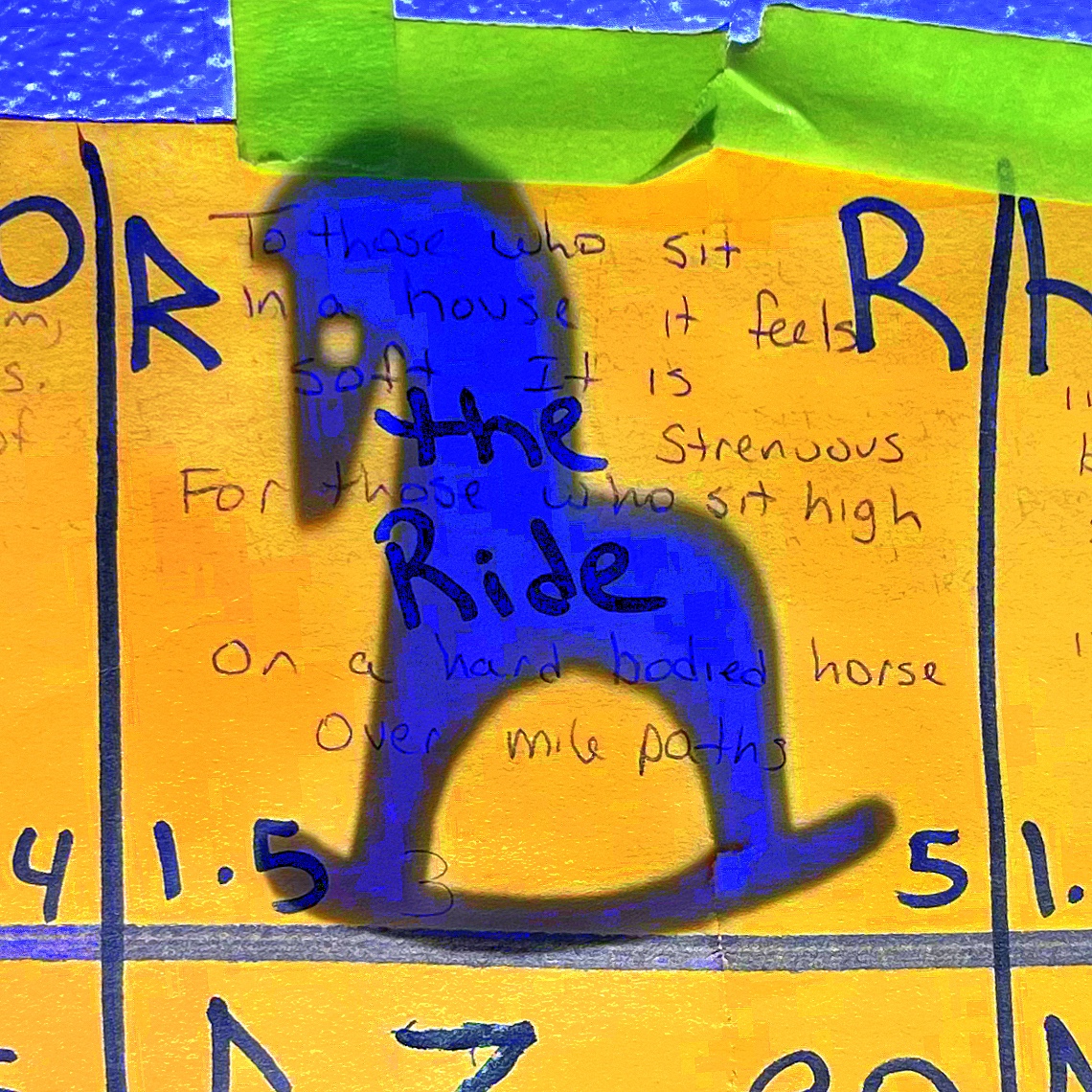
ᚱ byþ onrecyde. rinca gehwylcum.
sefte and swiþhwæt. ðam ðe sitteþ on ufan
meare mægen heardum ofer mil paþas ᛬᛫
To those who sit in a house
It feels soft. It is strenuous for those who sit high
On a hard bodied horse over mile paths.
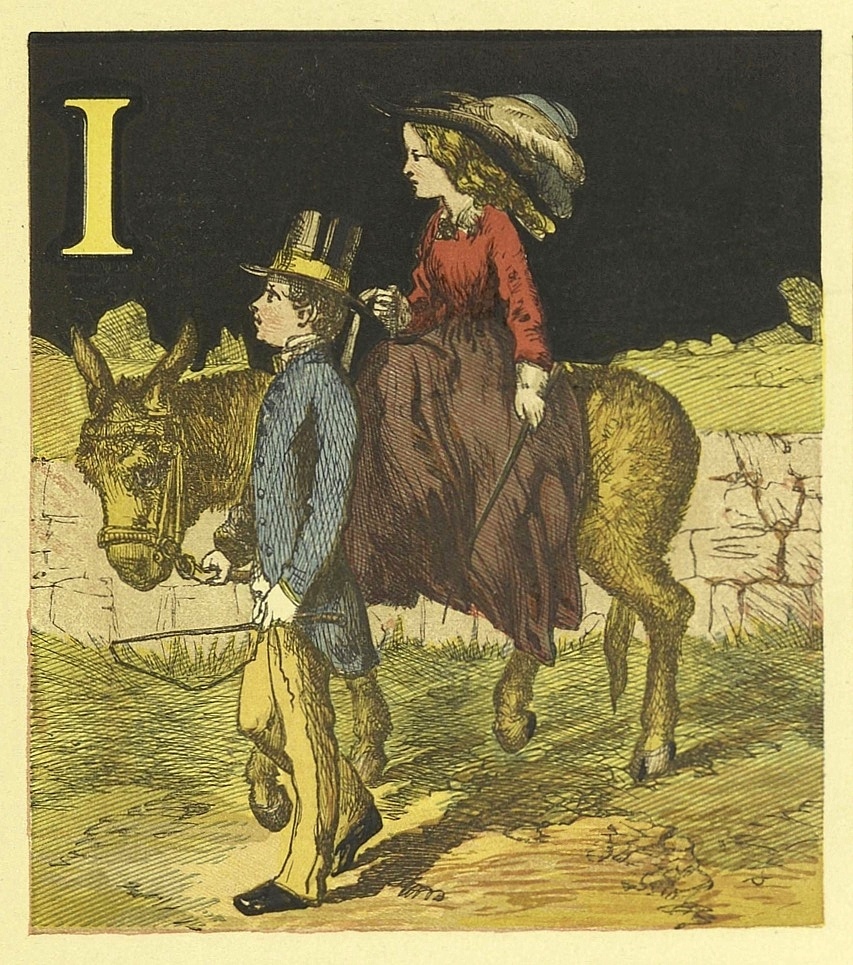
 Rad means riding on horseback, the ride itself. Sometimes it will mean the road, especially when found in a compound word. This stanza specifies it’s going to be a long ride ofer milpaþas. Mile paths. Long distances. These aren’t the paths between local settlements, this is a ride on the Roman roads built to take you somewhere far. The Roman roads had cylindrical mile stones set out every 1000 paces (mille in Latin means thousand, Roman numeral M). At these points the mile stones would tell the traveler how far to the next place, who’s the local boss, and sometimes the name of a person in charge of road repair. The Romans took their roads seriously.
Rad means riding on horseback, the ride itself. Sometimes it will mean the road, especially when found in a compound word. This stanza specifies it’s going to be a long ride ofer milpaþas. Mile paths. Long distances. These aren’t the paths between local settlements, this is a ride on the Roman roads built to take you somewhere far. The Roman roads had cylindrical mile stones set out every 1000 paces (mille in Latin means thousand, Roman numeral M). At these points the mile stones would tell the traveler how far to the next place, who’s the local boss, and sometimes the name of a person in charge of road repair. The Romans took their roads seriously.
The stanza points out that it’s easy to talk smack about the ride in a nice cushy recyde (a building) sitting somewhere sefte (soft) but when you are actually out there on a horse and … More
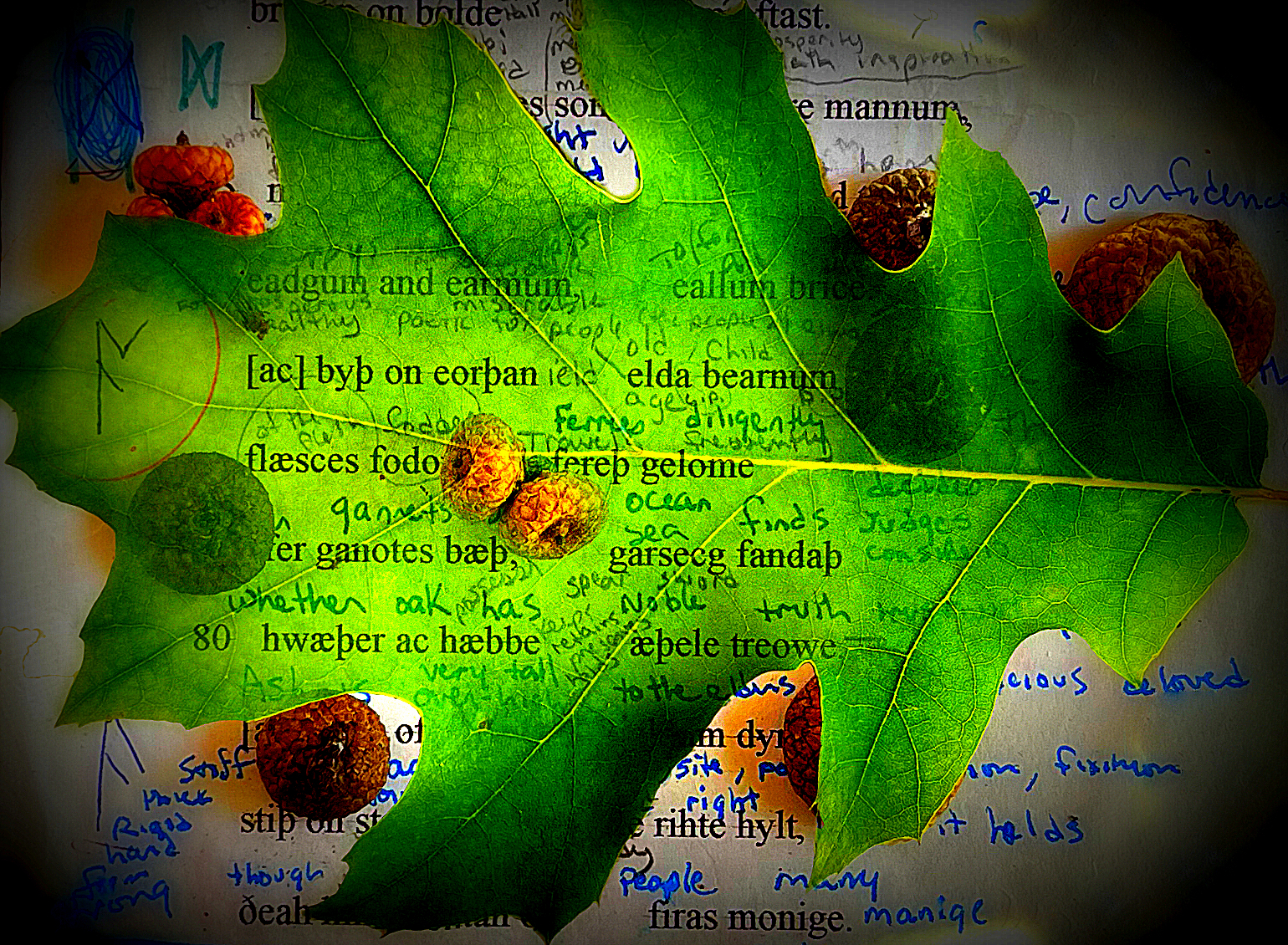 The Ac stanza is a bad riddle because the answer to the riddle is right there in the wording. Since when does an Old English riddle include its answer? I’ll tell you when. Never. That’s when.
The Ac stanza is a bad riddle because the answer to the riddle is right there in the wording. Since when does an Old English riddle include its answer? I’ll tell you when. Never. That’s when.
The Ac stanza is a good riddle because if it’s not Ac, then what is it? Hwæt? And if it does mean oak why does this riddle get to be so transparent? Let’s see if we can shine a light on it.
Clue: A line of Old English poetry starts with three alliterating stresses, three words that start with the same letter, and ends with a fourth stress that does not alliterate. The answer to the Rune Poem’s riddles is always the missing first word, so the first clue is always to be found in the beginnings of the next two stressed words: eorþan (earth) and elda (age). The answer to this riddle must be a word … More
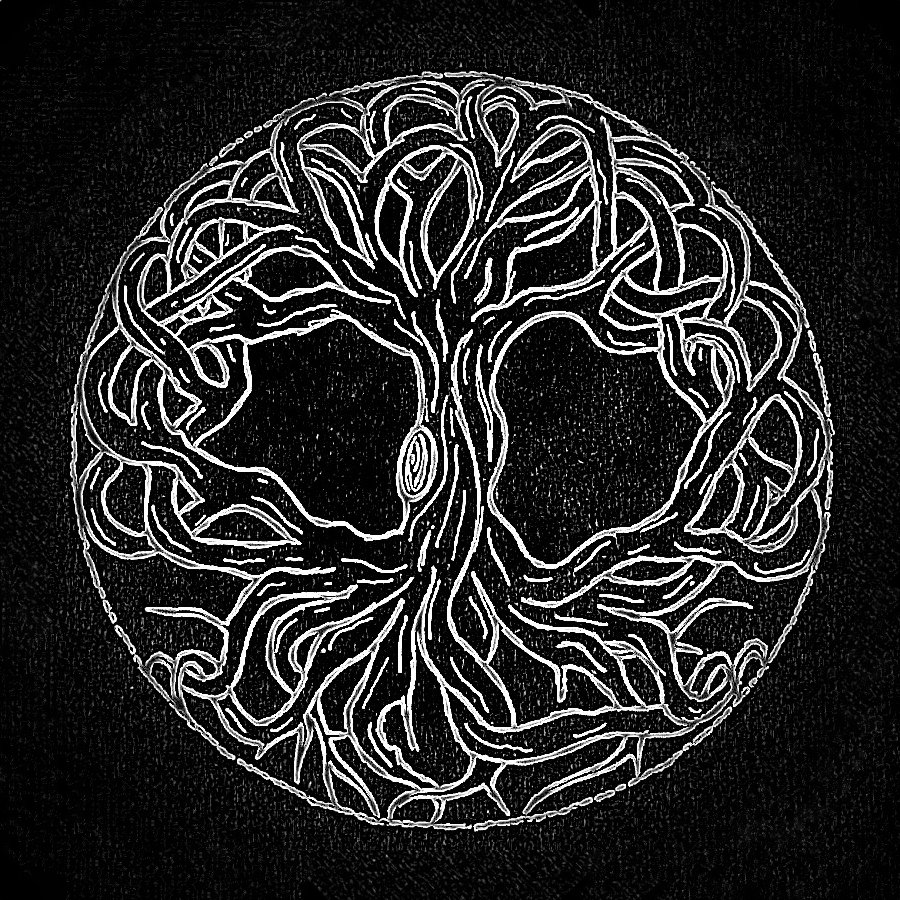 Crann Bethadh means tree of life in Old Irish. It’s an oak tree. The Celts used to plant them in the centers of their villages where they could be the axis mundi, the pillar holding everything up, the pivot around which it all turns. It’s a sacred world tree, and an older one than the one in the Old English Rune Poem, which stand right there next to it in order. In the Rune Poem, oak is the letter A, which comes right after D. In the Ogam alphabet written down in Old Irish, D is an oak. When they needed new runes for new sounds and invented the oak rune, they kept it close to its roots.
Crann Bethadh means tree of life in Old Irish. It’s an oak tree. The Celts used to plant them in the centers of their villages where they could be the axis mundi, the pillar holding everything up, the pivot around which it all turns. It’s a sacred world tree, and an older one than the one in the Old English Rune Poem, which stand right there next to it in order. In the Rune Poem, oak is the letter A, which comes right after D. In the Ogam alphabet written down in Old Irish, D is an oak. When they needed new runes for new sounds and invented the oak rune, they kept it close to its roots.
The Ogam alphabet uses bríatharogam to describe each letter name. These are two word descriptions that act as riddles or metaphors and work in a similar way to Old English kennings, which are either compound … More
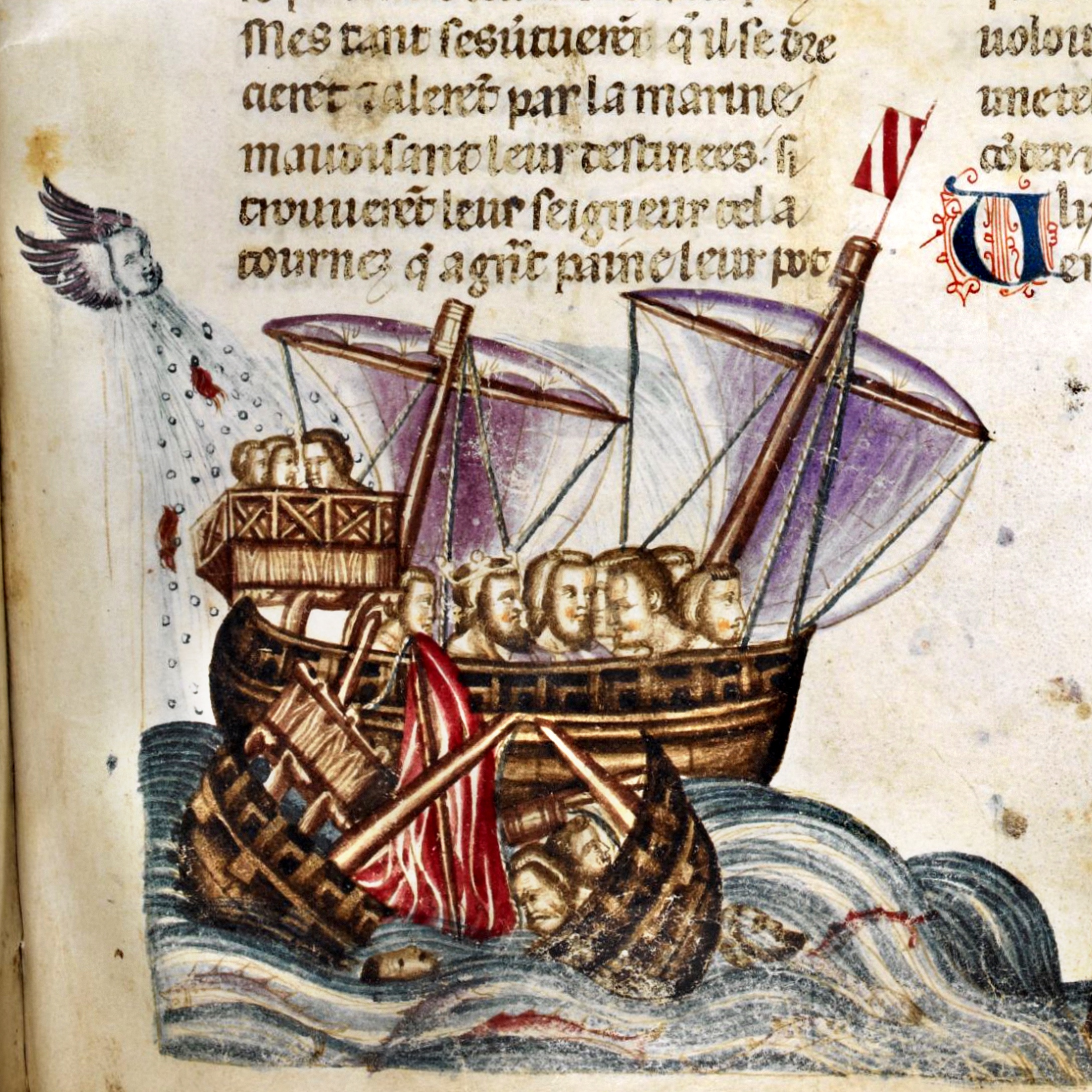 Provision yourself, because Ac says you are going on a journey and it won’t be smooth sailing. You’re already gone, you know that? Warning: these choppy waters might shatter you into matchwood. You’re about to find out what you’re made of. What were you made for? This. You were made for this so hold true.
Provision yourself, because Ac says you are going on a journey and it won’t be smooth sailing. You’re already gone, you know that? Warning: these choppy waters might shatter you into matchwood. You’re about to find out what you’re made of. What were you made for? This. You were made for this so hold true.
 You’ve been discussing it forever, but here it is, the Rad rune telling you it is time to get back in the saddle and get the show on the road. Big talk is one thing, now is the time for you to be going places so get going. It’s a long trip and a bumpy ride, but you’ll get there.
You’ve been discussing it forever, but here it is, the Rad rune telling you it is time to get back in the saddle and get the show on the road. Big talk is one thing, now is the time for you to be going places so get going. It’s a long trip and a bumpy ride, but you’ll get there.
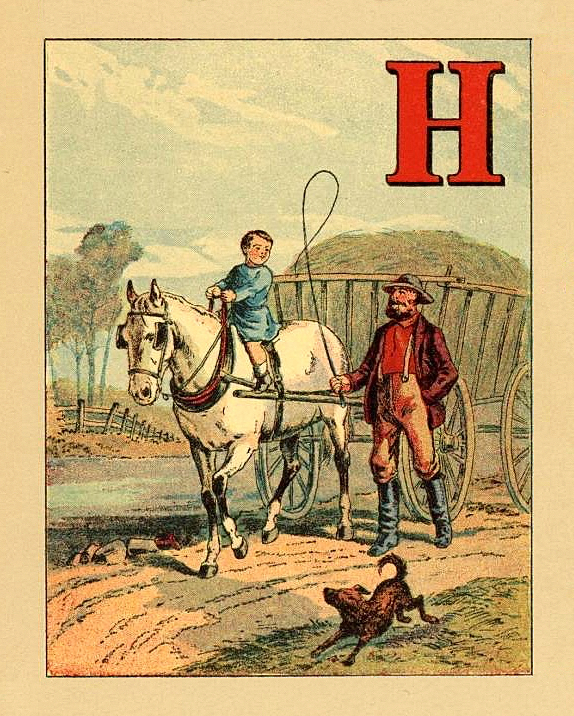
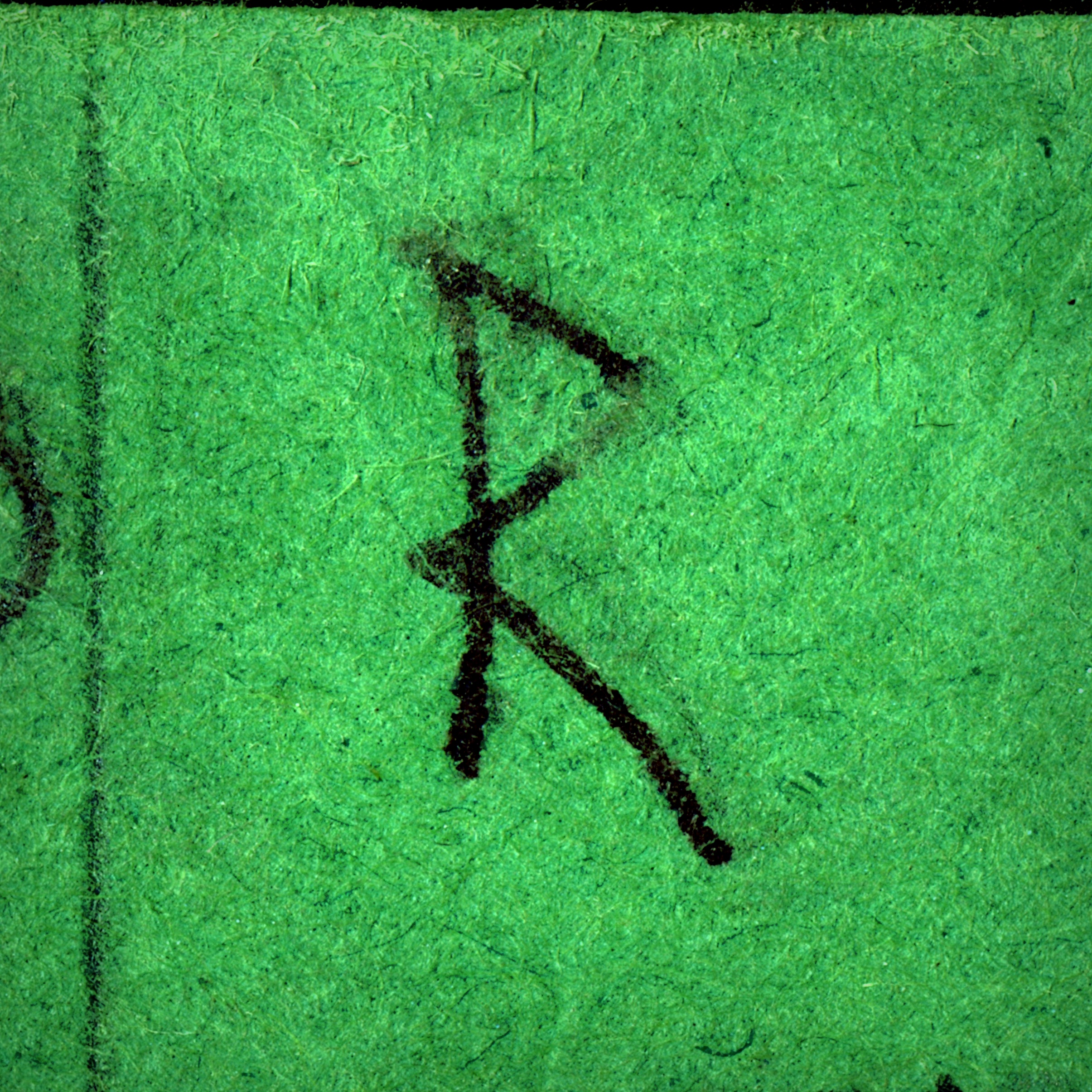 Probably the R in Old English was trilled or rolled. They’d travel along with the R for an extra beat before moving on to the next letter. Put your tongue near the roof of your mouth and vibrate the air. For a trilled or rolled sound, touch the roof of your mouth right behind your teeth and do it again. Drumroll please. Faster!
Probably the R in Old English was trilled or rolled. They’d travel along with the R for an extra beat before moving on to the next letter. Put your tongue near the roof of your mouth and vibrate the air. For a trilled or rolled sound, touch the roof of your mouth right behind your teeth and do it again. Drumroll please. Faster!
Carve a straight path up. Now send a crooked road traveling back down the side.

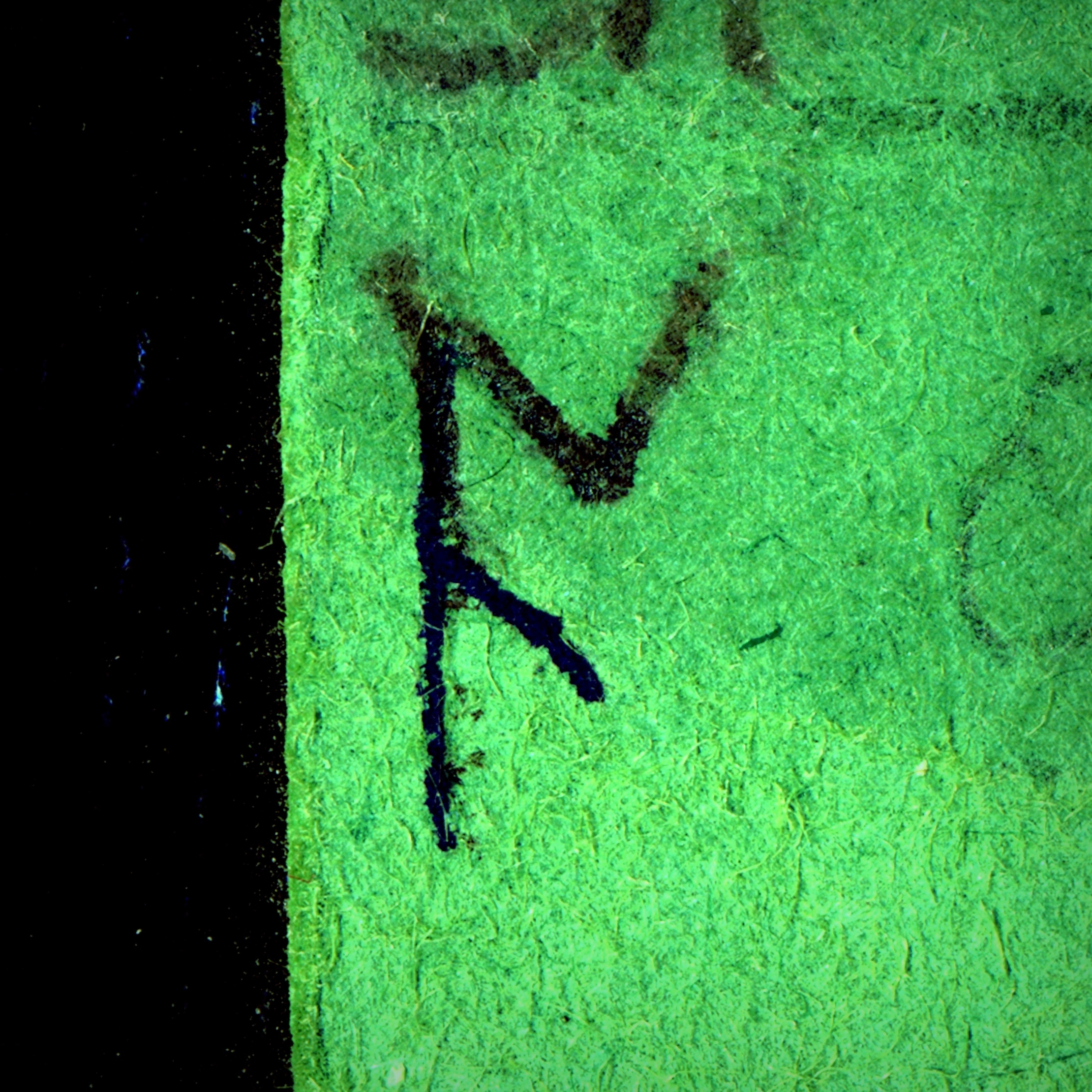 In the Old English Rune Poem the letter A means oak. This was the most sacred tree in most Celtic societies and to the Baltic cultures living east of the Rune Poem’s people, where Ing went. In the Ogam alphabet, the earliest form of writing in Ireland, Oak is the letter D. D comes right before A in the Rune Poem alphabetic sequence, it’s adjacent, and the next letter after that is the another one of the sacred world trees, the Ash, Æ. The Old English Rune Poem plants the oak next to family and its own sacred tree.
In the Old English Rune Poem the letter A means oak. This was the most sacred tree in most Celtic societies and to the Baltic cultures living east of the Rune Poem’s people, where Ing went. In the Ogam alphabet, the earliest form of writing in Ireland, Oak is the letter D. D comes right before A in the Rune Poem alphabetic sequence, it’s adjacent, and the next letter after that is the another one of the sacred world trees, the Ash, Æ. The Old English Rune Poem plants the oak next to family and its own sacred tree.
A is an older sound in Old English than Æ or O. A became both of these letters, vowels are slippery like that. They pass through your mouth unrestricted by teeth or tongue or closed lips, so with all that out of the way, it’s only mouth shape and air flow that makes the … More

The ash tree is oferheah. Over-high. Tall. And it grows from nothing: the smallest sapling can become something oferheah, massive, with root systems that are fairly shallow, but more extensive than most other trees growing in similar habitat. No wonder the stanza says it is stiþ on staþule, firm in its foundations. With far spreading roots like that it will stede rihte hylt, steadily and rightly hold firm in conditions that might cause another tree to topple. The wood from an ash tree is firm in another way too, it is a particularly hard wood and its grain grows straight, which makes it the ideal wood for a spear: it can take a powerful blow without splintering. Several blows. It also makes fantastic handles for axes and daggers. This is why the Rune Poem says him feohtan on firas monig: many people fight it, it made great weapons.
Don’t fight the … More
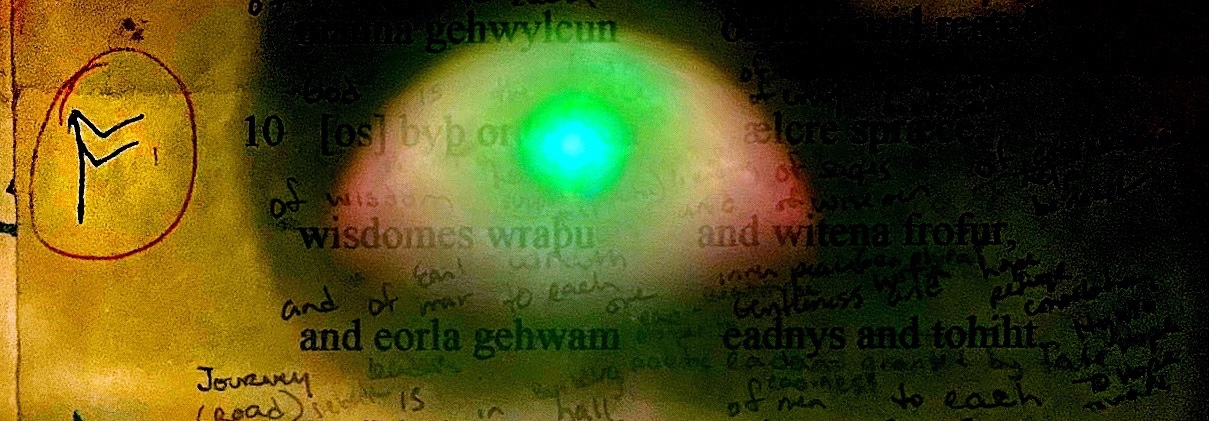 Os means God, non specified, though this stanza might be talking about a specific one. There are other specific gods in the Rune Poem. Tiw is here. So is Ing. We don’t know much about Ing. We don’t know much about any of the Gods the rune carvers were listening to. We do know the Nordic ones thanks largely to the thirteenth century Icelandic poet Snorri Sturluson, who compiled folk traditions into stories for a Norse king who liked his entertainment. Britain also being a North Sea culture, there was plenty of overlap. There’s not much written about the deities in Old English, though. Most everybody doing the writing was Christian, so. They had an agenda. These Christians preferred a reduction of the Gods down to a singularity, a point encompassing all other points, so the extra Gods they’d encounter tended to disappear.
Os means God, non specified, though this stanza might be talking about a specific one. There are other specific gods in the Rune Poem. Tiw is here. So is Ing. We don’t know much about Ing. We don’t know much about any of the Gods the rune carvers were listening to. We do know the Nordic ones thanks largely to the thirteenth century Icelandic poet Snorri Sturluson, who compiled folk traditions into stories for a Norse king who liked his entertainment. Britain also being a North Sea culture, there was plenty of overlap. There’s not much written about the deities in Old English, though. Most everybody doing the writing was Christian, so. They had an agenda. These Christians preferred a reduction of the Gods down to a singularity, a point encompassing all other points, so the extra Gods they’d encounter tended to disappear.
The word Os was disappearing too, by the … More
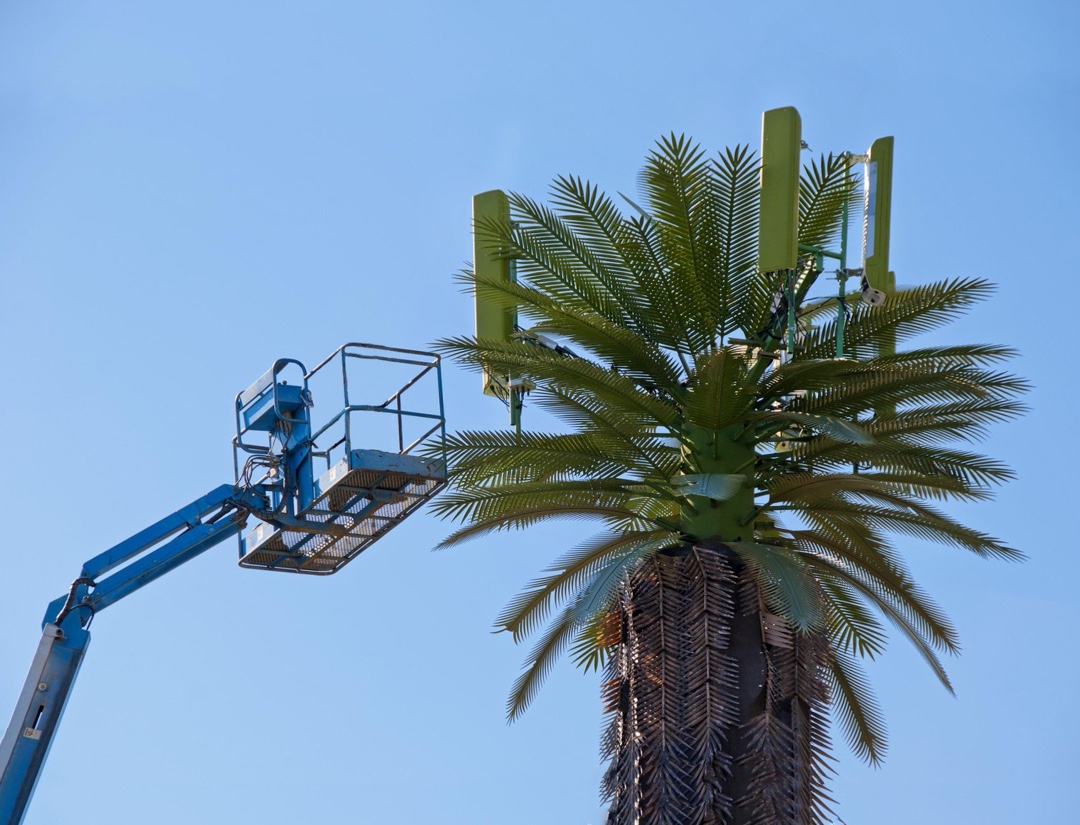 Reordberend the tree called me,
Reordberend the tree called me,
It says I am a speechbearer.
It thinks I am an odd little tree,
A small beech or confused shrub in error.
It looks to me, I said to this tree
That you’re the one who’s confused.
Don’t you see? You’re talking for me,
If you say you’re a tree it’s a ruse.
 Did you know that tree means truth? Well it does, honestly, let me be the first to tell you so you know it’s true. The Old English word treow means both tree and truth. Lots of Old English words use treow in them to mean things like to trust or believe (treowan), or to be faithful (treowfæst, truth-fast). Treow is used for more woody things too, like when you take your treowfæstnian (trusty) ax to the treowsteall (a grove) to work as a treowwyrtha (carpenter) treowfeging (joining boards together) into a treowgeweroc (tree work, something made of wood). In that treow grove you’ll find forest birds (treowfugol) and faithful friends (treowgeðofta) who’ll go in for a little tree worship (treowweroðung) with you and with whom you might find treowlufu (true love). Watch out for the treowles and treowleasnes.
Did you know that tree means truth? Well it does, honestly, let me be the first to tell you so you know it’s true. The Old English word treow means both tree and truth. Lots of Old English words use treow in them to mean things like to trust or believe (treowan), or to be faithful (treowfæst, truth-fast). Treow is used for more woody things too, like when you take your treowfæstnian (trusty) ax to the treowsteall (a grove) to work as a treowwyrtha (carpenter) treowfeging (joining boards together) into a treowgeweroc (tree work, something made of wood). In that treow grove you’ll find forest birds (treowfugol) and faithful friends (treowgeðofta) who’ll go in for a little tree worship (treowweroðung) with you and with whom you might find treowlufu (true love). Watch out for the treowles and treowleasnes.
Tree and truth were more than … More

There are three kinds of apostrophes, grammatical don’t you know, botanical (when bits of protoplasm and such gather on plant cell walls adjacent to other plant cell walls, the more you know) and rhetorical. O reader did you know, the meaning of apostrophe that came first and the one I’m on about today is the rhetorical one?
The word apostrophe comes from Latin and Greek words that mean to turn away, a turning. It’s when the speaker or the writer stops everything and words directed at an audience turn elsewhere. Where to? To people not in the scene, to an object maybe. O tree, hear my words and tell me my fate! Or a concept. O language, you never stop you slippery Proteus! It’s a turn from the reader but also a turning of the reader. Turn this way. Follow me here. Listen to me say things that you can hear to something or somebody … More
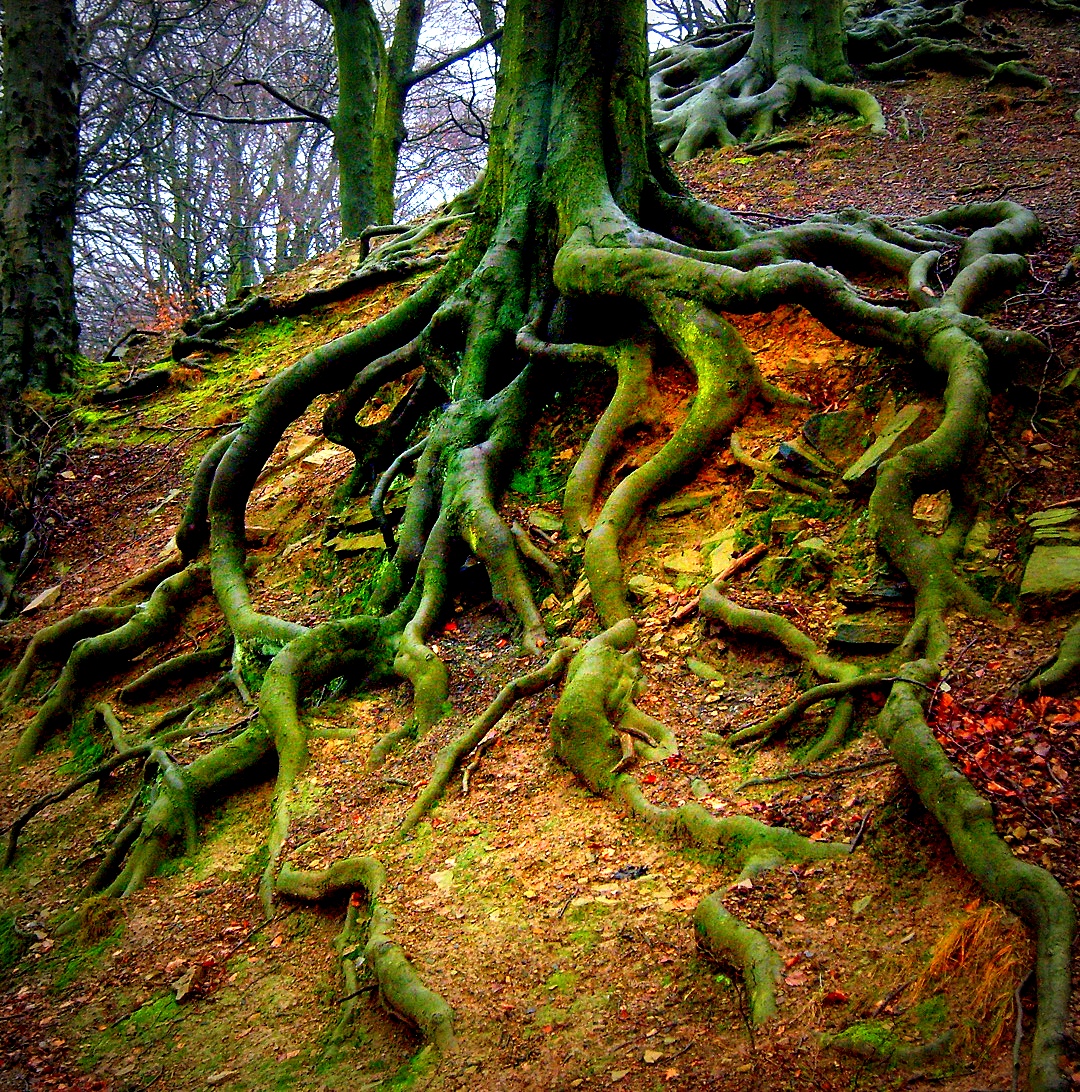 You getting it from all sides? Lots of people want to take you on? Something’s coming for you, but this is the Æsc rune, and it is used to a good fight. It’s seen plenty of battles, and yours is no different. Æsc says stand tall and plant. You hold steady, firm in your foundations. Those roots you draw from go deep, farther than you know, all the way into your ancestry so connect with your elders, get right with them and hold.
You getting it from all sides? Lots of people want to take you on? Something’s coming for you, but this is the Æsc rune, and it is used to a good fight. It’s seen plenty of battles, and yours is no different. Æsc says stand tall and plant. You hold steady, firm in your foundations. Those roots you draw from go deep, farther than you know, all the way into your ancestry so connect with your elders, get right with them and hold.
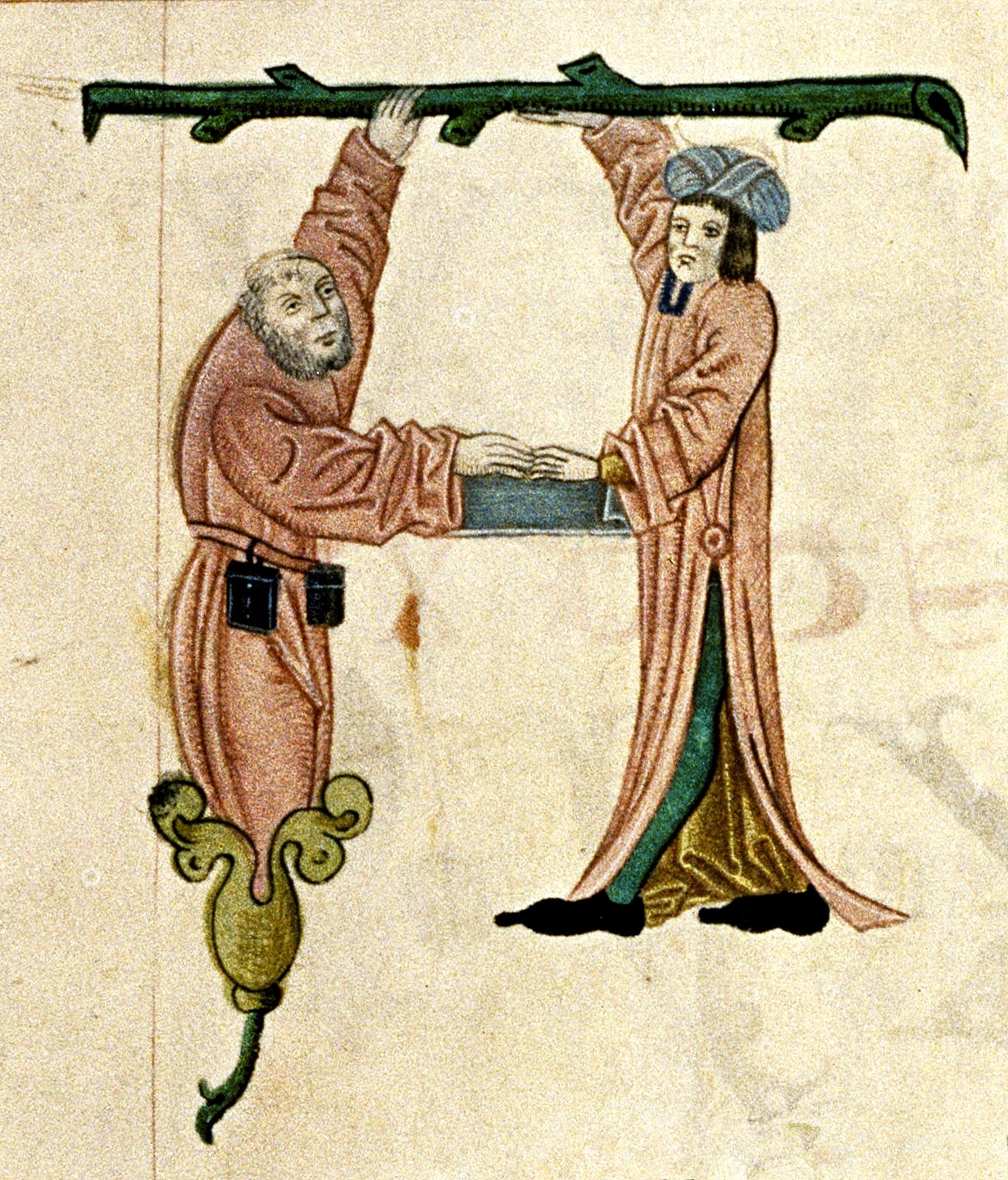
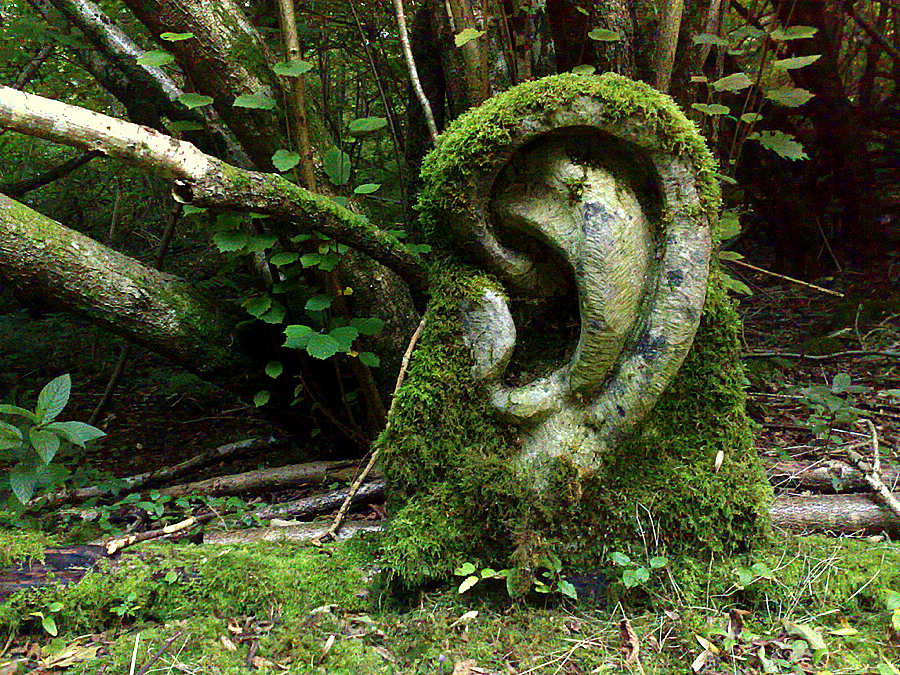 You want to hear from your God and got the God rune. You pulled a rune that tells you to talk to the Gods with runes. That’s some nested levels of scale messaging from your deity right there. Here’s what you do. Pay attention. That’s what to do. The Gods are talking, take comfort in that, be easy and remain hopeful. Divinity is talking to you on every level, you’re not on your own, so listen up.
You want to hear from your God and got the God rune. You pulled a rune that tells you to talk to the Gods with runes. That’s some nested levels of scale messaging from your deity right there. Here’s what you do. Pay attention. That’s what to do. The Gods are talking, take comfort in that, be easy and remain hopeful. Divinity is talking to you on every level, you’re not on your own, so listen up.
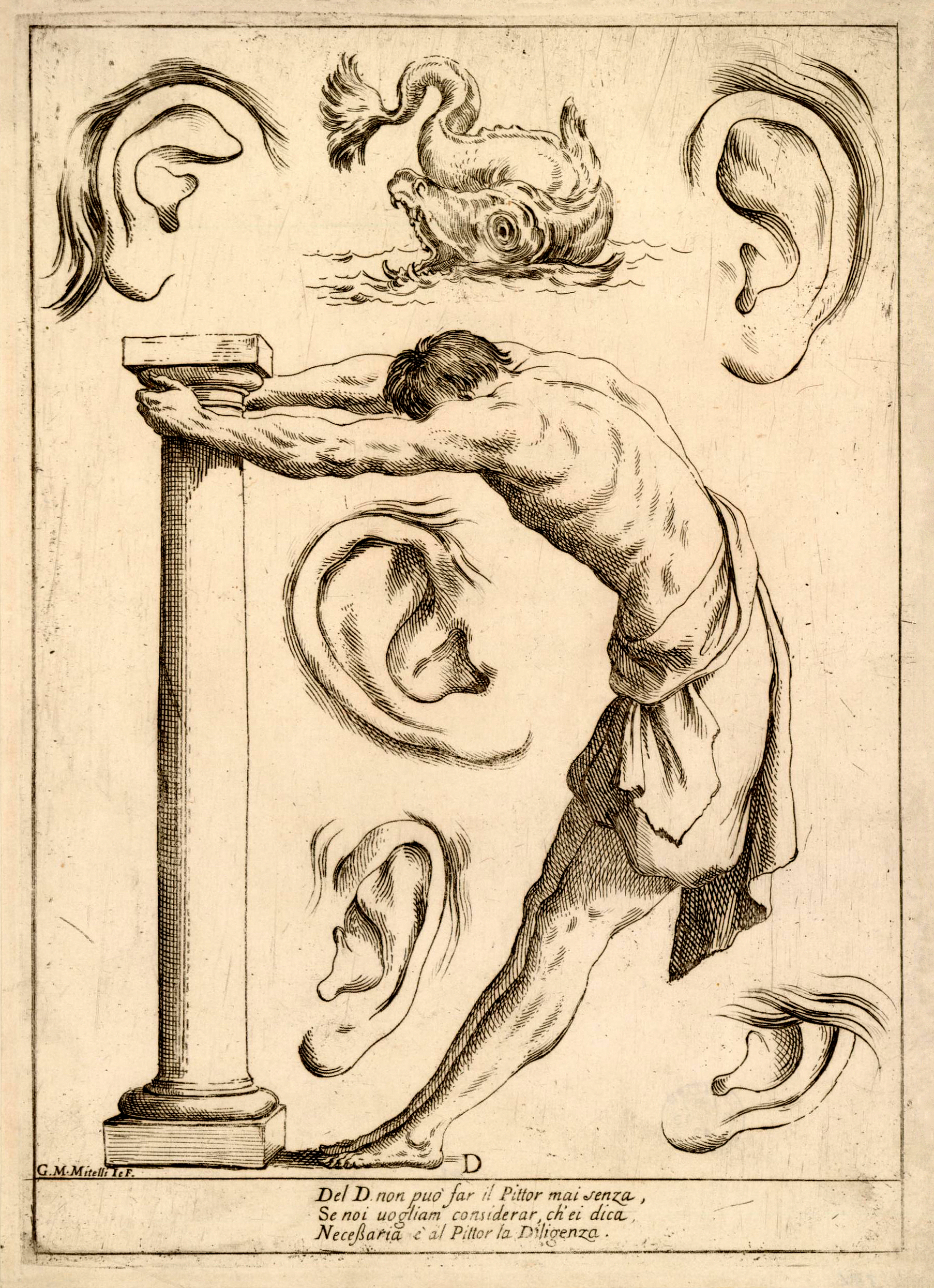
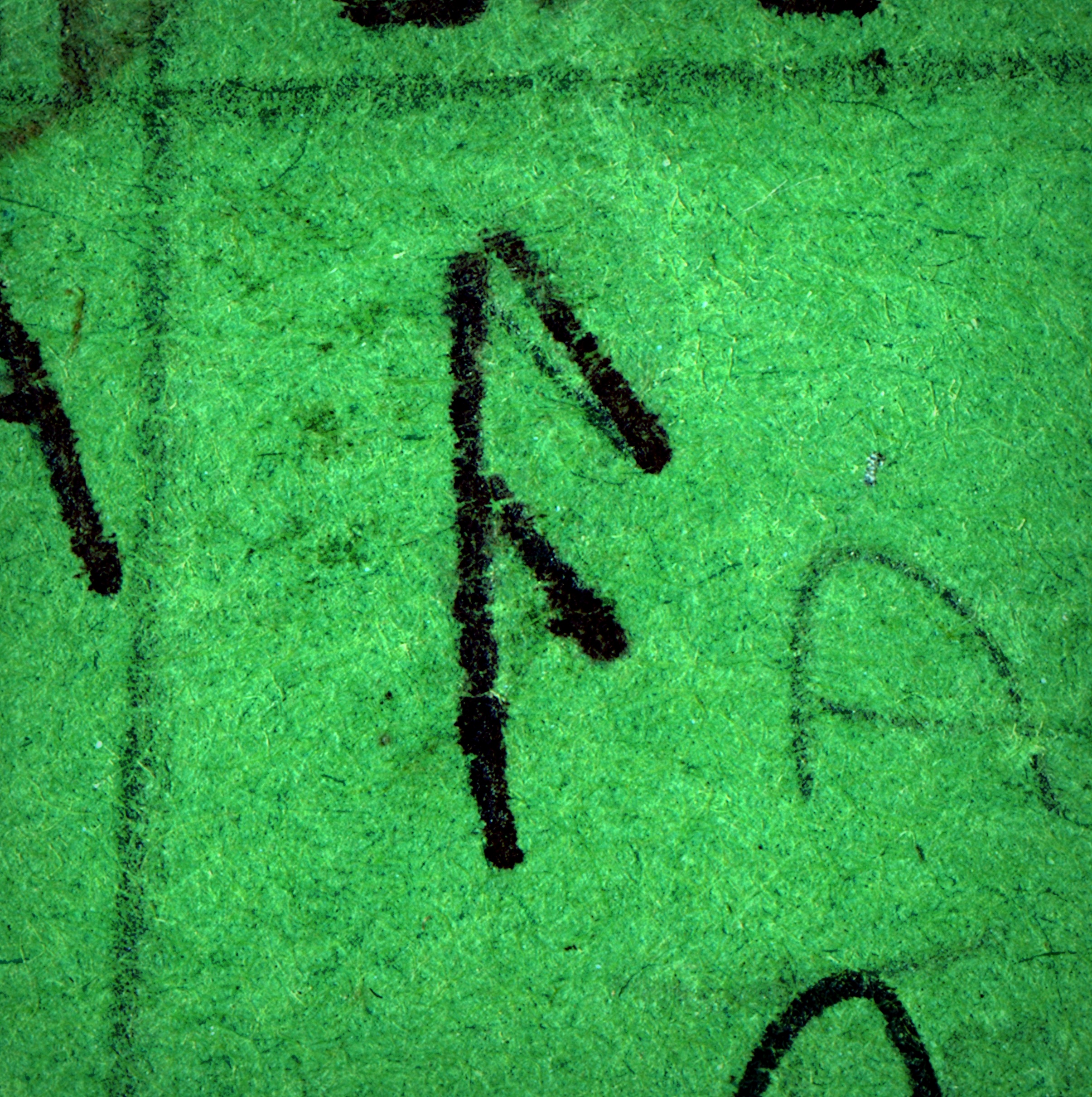 The ᚩ rune (O, Os) and the ᚪ (A, Ac) both started the same way, as new shapes of the ᚫ rune (Æ, Æsc) which once made the sound of the letter A, stood in the fourth position of the alphabet, and meant God. The A sound changed very early in the lifetime of Old English, vowels are shifty, and this one changed into O and Æ, so new runes were made with new meanings to represent the new sounds, and appropriate places were found for them in the alphabetic line up. Æ, sounds like the A in ash tree, which is its meaning, this is one of a whole grove of trees in the Rune Poem. It kept the original rune shape ᚫ while the others are derived from it, and was moved opposite it’s original 4th position to the 26th place. They put it there so it can … More
The ᚩ rune (O, Os) and the ᚪ (A, Ac) both started the same way, as new shapes of the ᚫ rune (Æ, Æsc) which once made the sound of the letter A, stood in the fourth position of the alphabet, and meant God. The A sound changed very early in the lifetime of Old English, vowels are shifty, and this one changed into O and Æ, so new runes were made with new meanings to represent the new sounds, and appropriate places were found for them in the alphabetic line up. Æ, sounds like the A in ash tree, which is its meaning, this is one of a whole grove of trees in the Rune Poem. It kept the original rune shape ᚫ while the others are derived from it, and was moved opposite it’s original 4th position to the 26th place. They put it there so it can … More
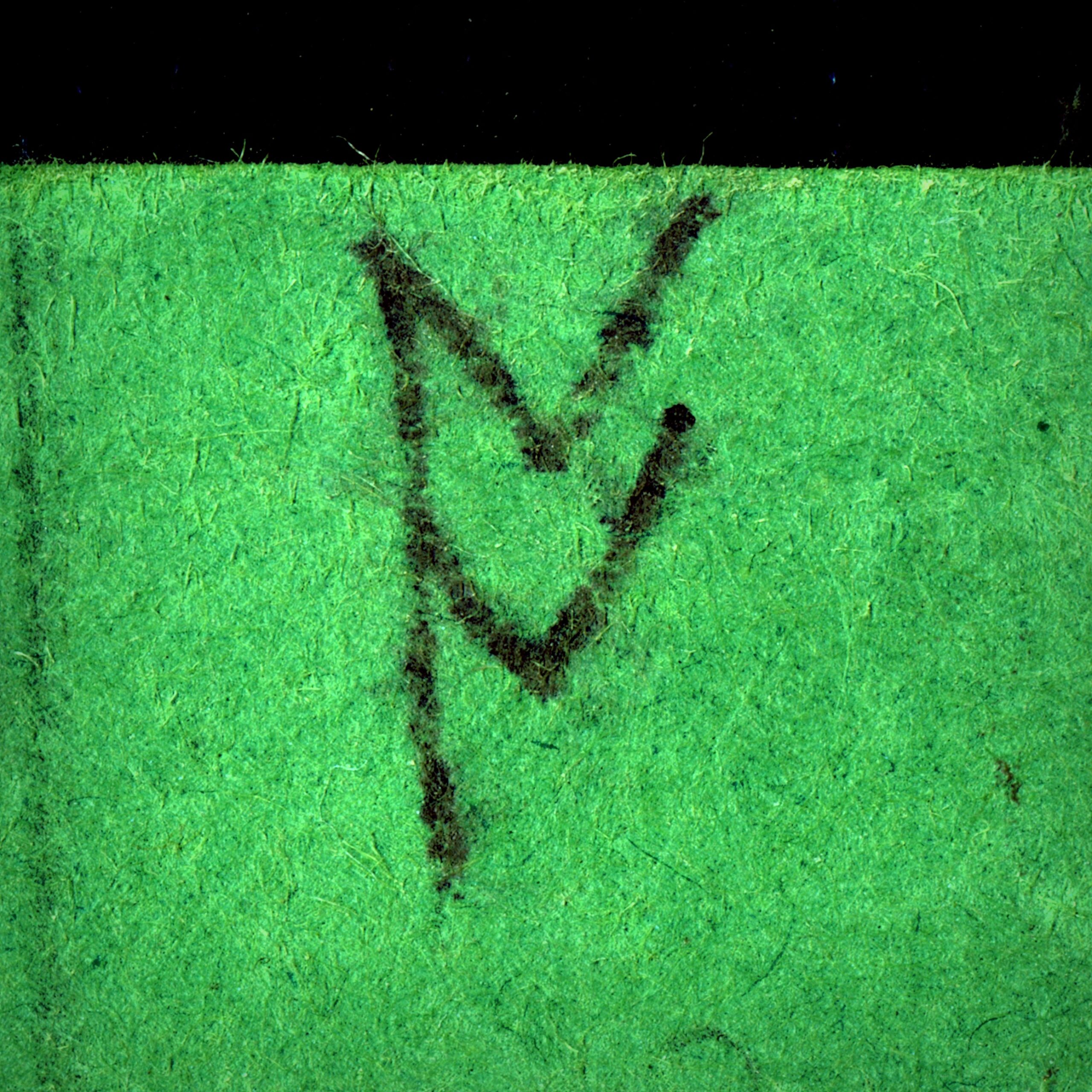 Vowels are slippery things. They shift around and we have to learn which sound differences to ignore as another person’s accent and which ones change meaning. In the earliest times of Old English history the sound of the letter A changed so much it became three letters, A (ᚪ), O (ᚩ), and Æ (ᚫ). The ᚫ rune was the original rune shape for the A sound and stands in the 4th position in the Norwegian and Icelandic runic alphabets where it makes the sound for the letter A and means God. In the Old English runic alphabet, ᚩ (Os) holds the 4th position where it still means God, but here it makes the sound O. Smote. Lot. That God that smote you is a lot. The O sound was once made by the ᛟ rune, Eþel, but by the time they wrote down the Rune Poem, Eþel was already slipping … More
Vowels are slippery things. They shift around and we have to learn which sound differences to ignore as another person’s accent and which ones change meaning. In the earliest times of Old English history the sound of the letter A changed so much it became three letters, A (ᚪ), O (ᚩ), and Æ (ᚫ). The ᚫ rune was the original rune shape for the A sound and stands in the 4th position in the Norwegian and Icelandic runic alphabets where it makes the sound for the letter A and means God. In the Old English runic alphabet, ᚩ (Os) holds the 4th position where it still means God, but here it makes the sound O. Smote. Lot. That God that smote you is a lot. The O sound was once made by the ᛟ rune, Eþel, but by the time they wrote down the Rune Poem, Eþel was already slipping … More
 Let’s worry about the þegna, the thegns. They set up camp at night, prepare food, tend to horses, fires. Get ordered around by el jefe to do every damn thing. They can’t do that themselves? Come on. It’s late. The thegns are tired. They have to be up first and early to get the whole show back on the road. All that work and nervous energy. It’s going to be a battle! They’re wiped out and finding places to sleep. Let’s pause here.
Let’s worry about the þegna, the thegns. They set up camp at night, prepare food, tend to horses, fires. Get ordered around by el jefe to do every damn thing. They can’t do that themselves? Come on. It’s late. The thegns are tired. They have to be up first and early to get the whole show back on the road. All that work and nervous energy. It’s going to be a battle! They’re wiped out and finding places to sleep. Let’s pause here.
Raise you hand. Have you ever walked right into a bramble of some kind, in broad daylight, and you didn’t see it until the burning tear right into your skin? This is Britain. They have thorns all over the place. Do you live where blackberries grow like a plague upon the land? I do. They hurt. Now, find a place to sleep at night like a tired thegn in the super … More
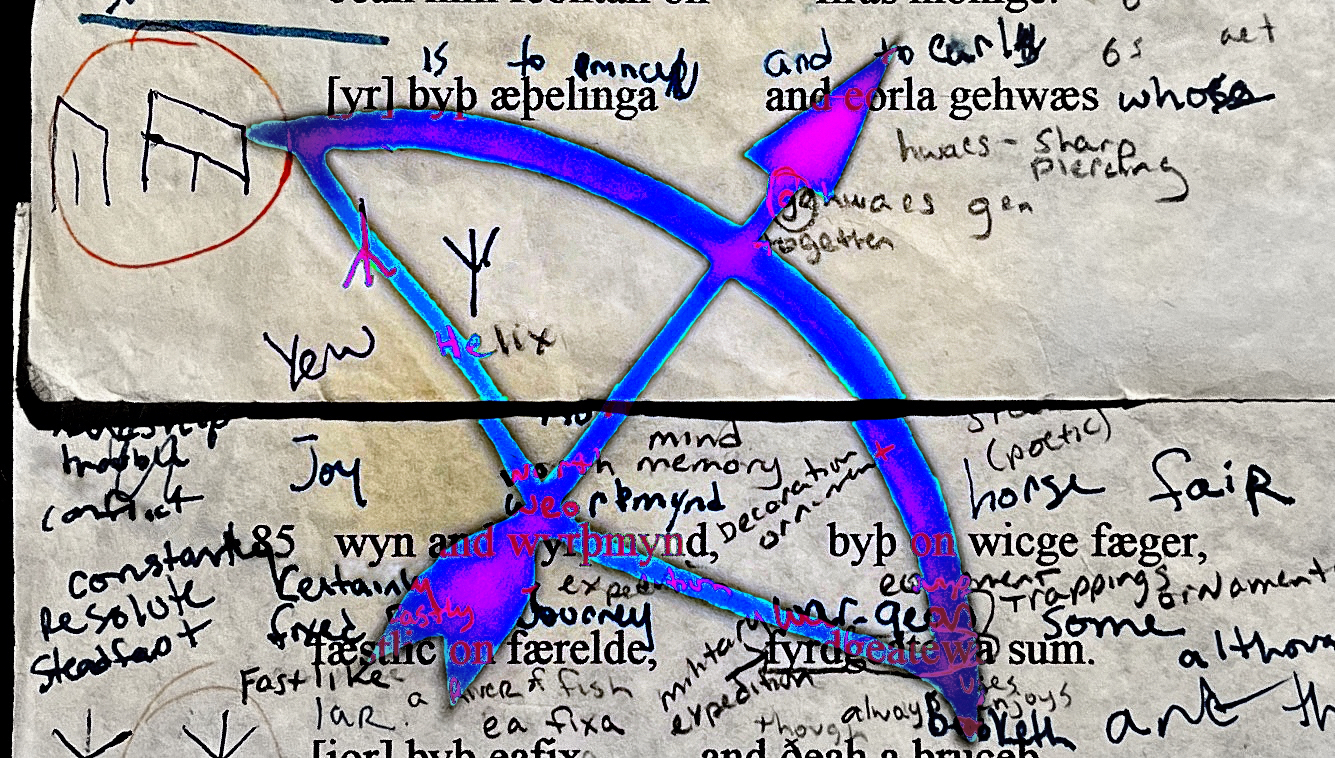
In Old English yr means only the name for this rune. A bow is a guess, a bow made out of yew. In Old Norse yr means the yew tree. The Icelandic Rune Poem says yr is “bent bow and brittle iron, and Farbauti (a giant) of the arrow.” Yew Bows from Britain were prized all over Europe, so I think a yew bow as an answer to this riddle makes the most sense from the minimal context we have. But in Old English yew is spelled eoh, so this rune could be describing something else. Some think this stanza describes a horn or a saddle bow or buckle. Whatever yr was, it was something to see. This is what this stanza is all about. Being something to see. Looking good on a horse. That’s sexy. Nobody wants to look bad on a horse.
This rune is about the elite. They could … More
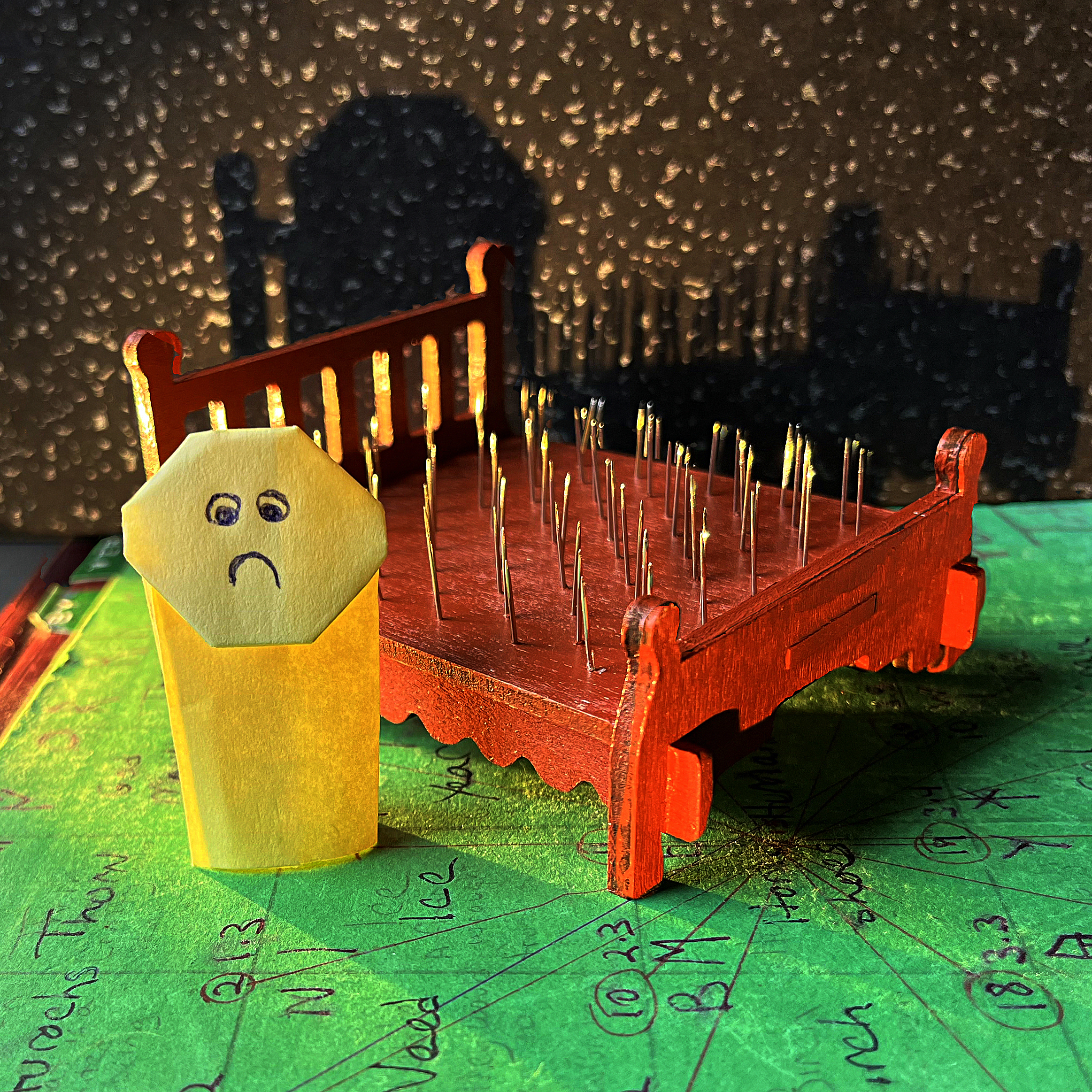 You all right? You seem uncomfortable. Well you should be, with what’s coming to you. You got the Thorn rune. You’ve put yourself into a prickly situation so don’t grab for more or you’ll have an evil time of it. Watch where you sleep too and who with, that’s no bed of roses. Don’t even rest your eyes. You’d better listen to me sharpish, or it will be unmet cruelty for you. If you make this particular bed baby love, you’re going to have to lie in it.
You all right? You seem uncomfortable. Well you should be, with what’s coming to you. You got the Thorn rune. You’ve put yourself into a prickly situation so don’t grab for more or you’ll have an evil time of it. Watch where you sleep too and who with, that’s no bed of roses. Don’t even rest your eyes. You’d better listen to me sharpish, or it will be unmet cruelty for you. If you make this particular bed baby love, you’re going to have to lie in it.
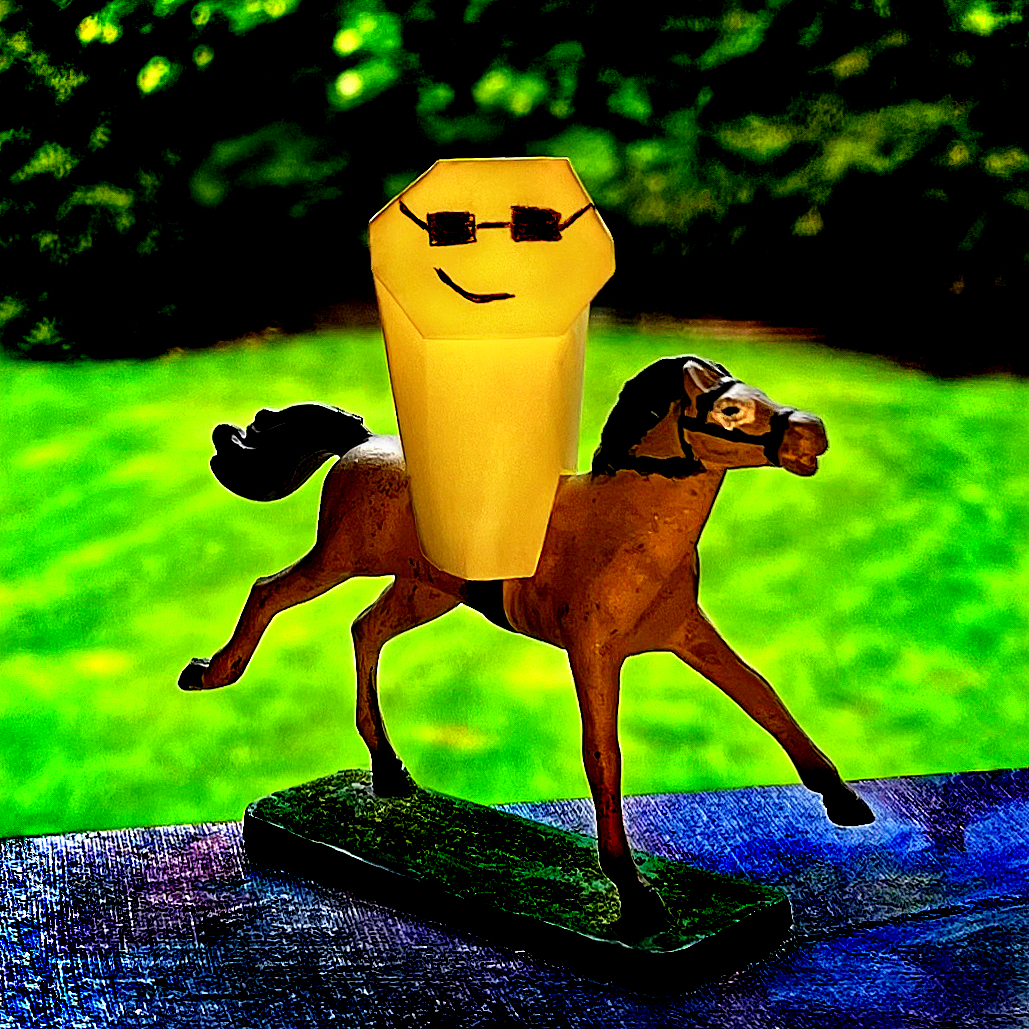 Look at you, you’re a gorgeous one. Hello. Such a pleasure to see you looking so impressive today. You’re good for looking at, is this the rune you picked? Yr? It looks good on you. Where’d you get it? Goes with your eyes. Sparkling, shining, scowling some, but you’re in a hurry. I get it. Hold your horses diva. Give us a chance to see you in all your gloriousness, before you set off. You are going places and you’ll impress when you get there. Your time is coming so you’d better bring it. You look ready for this fight. When you stay ready you don’t have to get ready and you look fierce. You will be remembered. You will be worth remembering.
Look at you, you’re a gorgeous one. Hello. Such a pleasure to see you looking so impressive today. You’re good for looking at, is this the rune you picked? Yr? It looks good on you. Where’d you get it? Goes with your eyes. Sparkling, shining, scowling some, but you’re in a hurry. I get it. Hold your horses diva. Give us a chance to see you in all your gloriousness, before you set off. You are going places and you’ll impress when you get there. Your time is coming so you’d better bring it. You look ready for this fight. When you stay ready you don’t have to get ready and you look fierce. You will be remembered. You will be worth remembering.
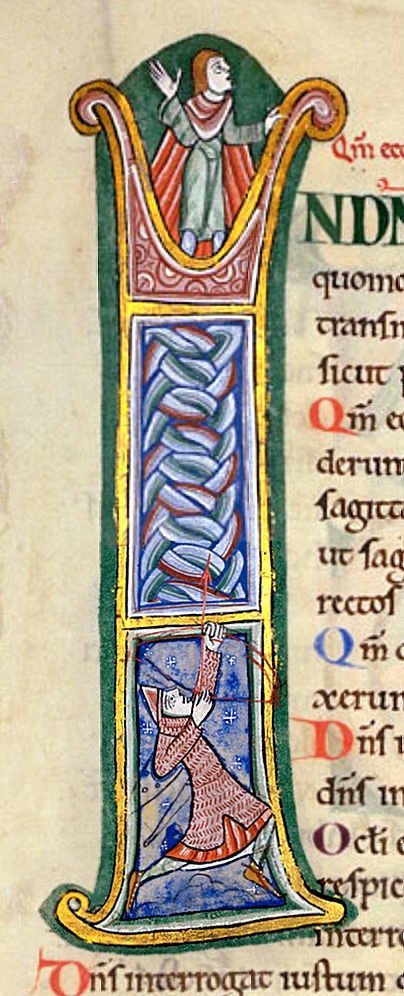
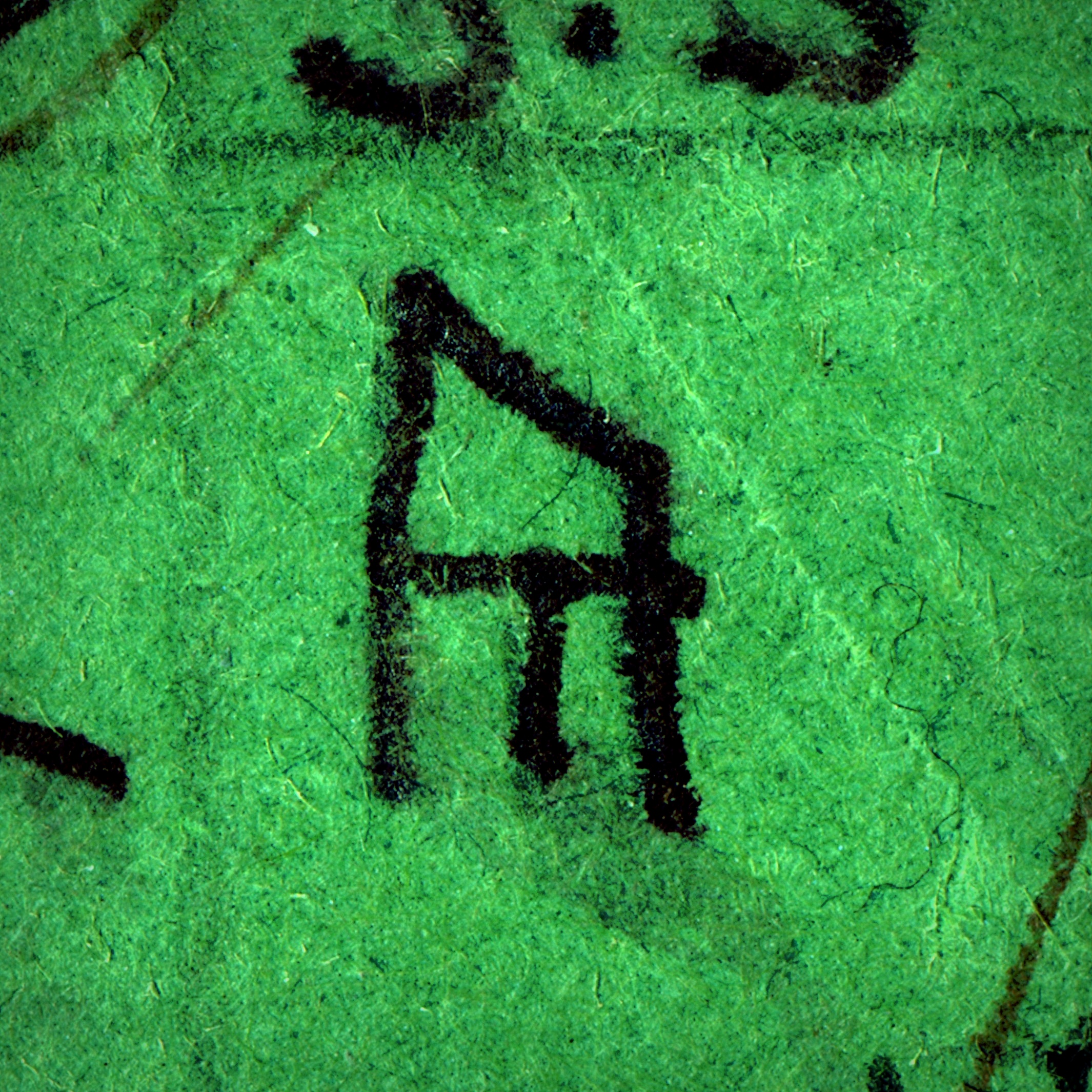 Say something. Go ahead, you heard me, say it and listen to yourself. Now say it about a hundred years ago. Hear it? You can hear it. Different. Speech sounds change. Accents change. You’ve changed. You think you sound the same but go back home after some distance and they’ll tell you different. And they’ll tell it to you differently. English has changed, big time, my God it’s different. It’s old. It’s medieval. Let’s think of a famous medieval person, to see how old. Somebody with a real mark of distinction. Dante. Dante Aligheri. He finished writing the Divine Comedy in 1320. He’s really really old, hundreds of years. Think of this, in this current moment we are closer in years to Dante than he was to the start of Old English. And from the Rune Poem to us he’s in the middle of the path of life. Not the runes, they’re even older, the … More
Say something. Go ahead, you heard me, say it and listen to yourself. Now say it about a hundred years ago. Hear it? You can hear it. Different. Speech sounds change. Accents change. You’ve changed. You think you sound the same but go back home after some distance and they’ll tell you different. And they’ll tell it to you differently. English has changed, big time, my God it’s different. It’s old. It’s medieval. Let’s think of a famous medieval person, to see how old. Somebody with a real mark of distinction. Dante. Dante Aligheri. He finished writing the Divine Comedy in 1320. He’s really really old, hundreds of years. Think of this, in this current moment we are closer in years to Dante than he was to the start of Old English. And from the Rune Poem to us he’s in the middle of the path of life. Not the runes, they’re even older, the … More
